What Should You Do if a Fire Breaks Out at the Front of Your Boat?
In the event a fire breaks out on your boat the first thing you want to do, as long as you can do so safely, is shut the engine down. This makes the situation more manageable and makes it less likely that you will add literal fuel to the fire. The engine is a fire risk and if it’s running then fuel is flowing which you want to avoid. In addition, if the engine is running you’re creating airflow that can feed the fire and force it to spread more quickly.
There are a handful of additional steps you’ll want to take to manage the situation once your engine is shut down and you are free to handle the blaze.
Make Sure Everyone is Wearing a PFD

These next steps will all happen pretty quickly. If anyone on the boat is not already wearing a life jacket, make sure they get it on right away as you move on to the next step of dealing with the fuel supply. Keep everyone away from the flames and the smoke as well. There’s a good chance any smoke will contain harmful chemicals that will be dangerous to breathe in so make sure everyone knows to avoid it as much as they possibly can.
Cut Off Fuel Supply
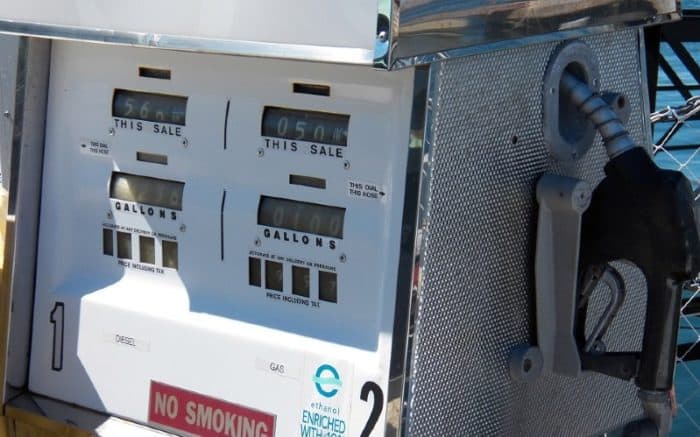
Once your engine is off, limit the fuel supply as best you can. Close the gas cylinders and if you have any portable gas cans or tanks, remove them from the area as quickly as you can. The less fuel exposed to the fire the better.
The emergency fuel cut off is important because if the fuel lines become compromised it will prevent fuel from spilling and igniting.
Choose a Safe Position

The way the wind blows can do a lot of damage in a short period of time with fire on a boat. Before you try to battle the blaze which will likely be your first instinct, change the position of the boat. This is going to make fighting the fire a lot easier and a lot less dangerous. If necessary, move the boat to put the fire downwind. You don’t want the wind pushing the fire further across the boat. Proper repositioning means the wind will be pushing against the fire, keeping it from spreading, and giving you more time to fight it and prevent damage or loss of life. This will also really help in preventing smoke inhalation.
With the engine shut off, you may need to use a paddle to do this successfully.
Use a Fire Extinguisher If It Will Help and/or Call for Help
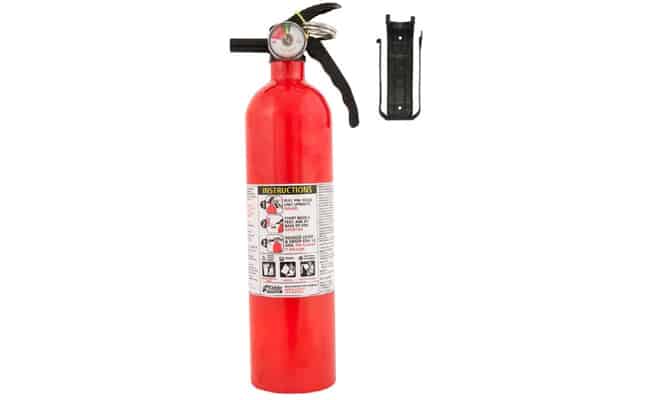
This is a point of contention for some people and not always the proper next step in this order. Some people will suggest you radio for help first and then fight the fire, others suggest the approach of fighting the fire then radioing for help. Ideally, if you have anyone else on the boat, you can do both simultaneously with one person radioing for help and another using a fire extinguisher. There are a few factors to consider.
- If you have two people on board each capable of handling one of these two tasks, proceed with doing both at once.
- If you are alone or with passengers who are unable to fulfill these tasks responsibly then you must gauge for yourself which step is more important first. I would lean towards fighting the fire with an extinguisher if it still looks small enough to manage. This is definitely a judgment call however and could end up being the wrong decision. You’ll have to know in the moment what your gut is telling you here. But I would say if the fire is still small enough that you think you can extinguish it quickly, go ahead and do so before using the radio.
- If you do not feel confident you can fight the fire back or you can see it’s already getting out of hand, call for aid immediately.
For the sake of explanation, let’s cover how to use the extinguisher first and then how to call for help second but switch up the order if you feel it’s appropriate. Safety is your top priority so keep that in mind above all else.
Using Fire Extinguishers

Every boat is required to have a fire extinguisher on board, and potentially more than one depending on the size. Larger vessels may have a fixed fire suppression system to help battle boat fires. Check out some regulations regarding marine fire extinguishers and other safety equipment here. Check the directions on your particular extinguisher but, for the most part, you want to stand about 6 feet from the fire and aim for the base of the fire. Pull the pin on your extinguisher, press the trigger mechanism and then use a sweeping motion across the base of the flames. Here’s a video that demonstrates some of what you should know about using a marine fire extinguisher.
The anagram they use to help remember what to do is PASS.
- P: Pull the pin
- A: Aim low
- S: Squeeze the handle
- S: Sweep back and forth
Remember to keep your extinguishers charged and up to date just in case of these kinds of emergencies. The Coast Guard should be inspecting your extinguishers to make sure they are compliant. If your extinguishers are charged below 90% they need to be refilled or replaced. We have some recommendations for marine fire extinguishers you can check out here that are ideal for use on any boat.
Caution: Only use a proper marine grade fire extinguisher. Never use water to try to put out a fire on a boat. If the fire is electrical or fueled by gasoline, grease or oil, water will make it much more dangerous. Electrical fires requires specific extinguishers so familiarize yourself with the different kinds and their uses.
Use the Radio to Call for Help
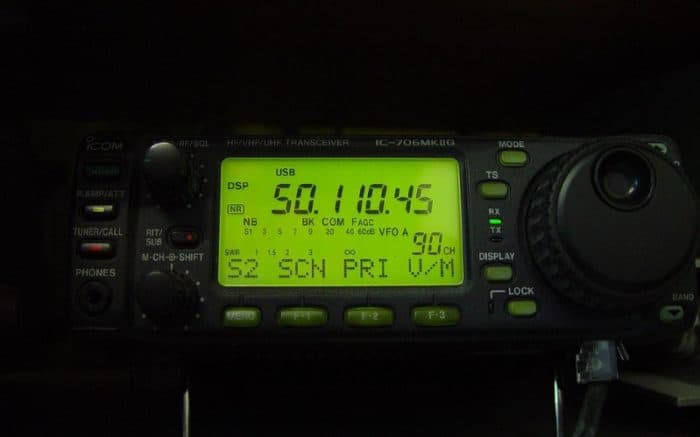
We have a detailed breakdown of how to call for help from emergency services on the water here that you can refer to. That said, you’ll want to turn your radio to channel 16 to make a distress call and then issue a mayday.
A proper mayday requires you to say “mayday mayday mayday, this is vessel <your boat’s name here.” Repeat this mayday message three times in a row. You’re trying to maximize the chances that someone clearly hears who you are and that you need immediate aid.
Next, give the following information:
- Description of your boat
- GPS coordinates
- How many people are on board
- The nature of the emergency
Finish by saying over and then wait at least 30 to 60 seconds for a reply. If no one replies, place the call again.
If you can’t get access to your radio because of the fire, you can use a cell phone in a pinch as well. If you are too far from shore you may not have good coverage however, and it could also take longer to relay the message through the proper channels. That’s why a VHF radio is ideal but anything you can do in an emergency can help.
Abandon Ship
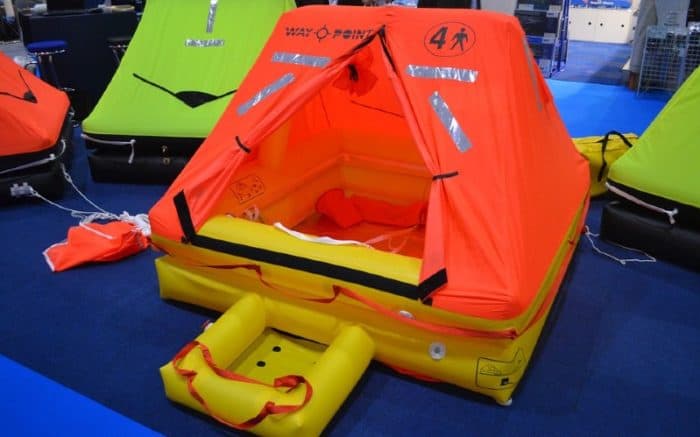
If necessary you may find yourself in a position to abandon ship. We have a guide to walk you through the process to abandon ship, and also information about what you should have in an abandon ship bag.
If the fire is not something you can control and the Coast Guard or other help is not going to be able to reach you in time, your safest bet is to leave the boat to save yourself and your passengers. It’s heartbreaking to think that you’re going to lose your boat but, at the end of the day, a boat is replaceable but the people on board are not.
If you have a life raft or dinghy that you can deploy, make sure you do so. Everyone should have their life jacket secure in place by now. Make sure everyone knows the plan and is in constant communication during this entire process.
You’ll want to get a safe distance from the boat as there’s a risk that your fuel tanks or any gas cylinders on board could explode. If necessary, deploy emergency equipment like an EPIRB to help emergency responders locate you.
Fire Prevention Tips
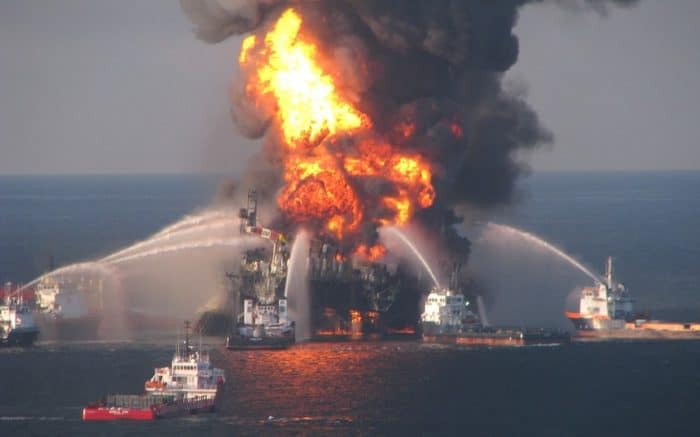
Based on statistics, fire accounts for well over $10 million a year in boat damages so your best bet is to prevent a fire before it happens. Most times when a boat catches fire it can be directly linked to one of the following:
- Engine issues (faulty engine, oil and grease buildup, engine overheating, etc)
- Fuel (gas leaks, spilled or improperly stores fuel)
- Smoking on board
- Electrical fire (faulty electronics, bad wiring, bad harnesses, battery issues)
- Excessive heat (extreme weather, flammable objects near hot surfaces, etc)
These are the main areas you’ll want to focus on when trying to fireproof your boat and ensure that a fire doesn’t get a chance to start in the first place and, if one does, you are prepared to deal with it quickly.
One thing to be aware of with a boat fire is that most fires don’t actually start onboard boats. Statistically they are more likely to start where you have your boat docked, like at a marina, and then spread onto your boat.
Do Regular Inspections
This is essential for good boat maintenance, but pay attention to the items listed above. Check your electrical connections with special attention to harnesses, connections, the battery and cord conditions. Check your ignition sources to make sure they’re in good order. Fuel cans, batteries, make sure they are all in good working order with no breaks, cracks or exposed components.
Keep it Clean
Make sure oil and grease are not allowed to build up anywhere and keep surfaces clean of flammable materials. Old engine grease is a real hazard. Likewise, if you spill fuel or notice a fuel leak make sure it’s cleaned up right away and give time for the area to air out if fumes have built up.
No Smoking
It’s best to have a no smoking boat at all times. If you do smoke, keep it limited to on deck in the open air. Never smoke below deck and especially around open fuel containers or engine oil.
Ventilation
Make sure you have proper ventilation if your engine is below deck and around where fuel may be stored. Ventilation is very important. Also, around any cooking areas. Explosive fumes can build up incredibly fast in a small area.
Keep Your Crew Educated
If you have other people on board, make sure they know emergency procedures. You may want to consider running fire drills if this is a family boat and you go out together regularly as well. Everyone should know where the fire extinguishers are and how to use them as well as the location of the PFDs. Training others on how to use the radio to call for help is also a good idea. Make sure everyone is clear on where to gather on deck in an emergency and that staying calm is key to ensuring a safer outcome.
Be Insured
I can’t stress enough how important it is to have proper insurance on your boat. A lot of people let this slide because they think it won’t happen to them but it’s just not worth it. Keep your insurance up to date.
The Bottom Line
If a fire breaks out on your boat you need to keep calm and react quickly. Cut off your engine and the fuel supply as quickly as possible, and position the boat into the wind to keep the fire from spreading. Make sure your passengers are wearing life jackets and safely away from the flames and smoke. Use the PASS method to fight the fire with your on board fire extinguisher and make sure you use your VHF radio to call for help.
Few things are as scary as a fire on a boat but if you use preventative measures to help minimize the chance of one breaking out and know what you need to do in case of emergencies, you can limit the damage and save lives.
Categories: Boats
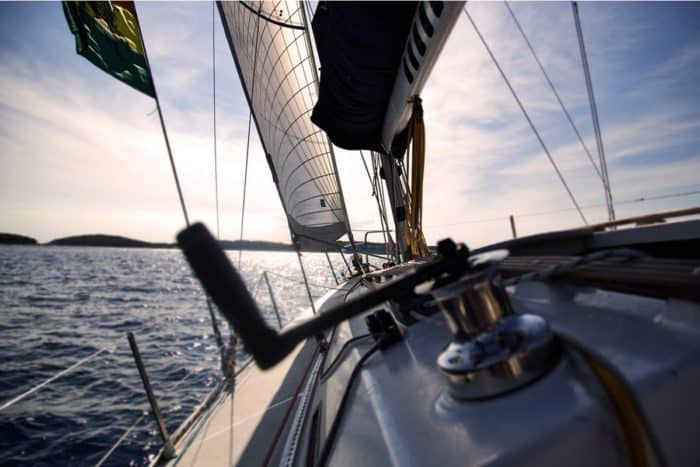

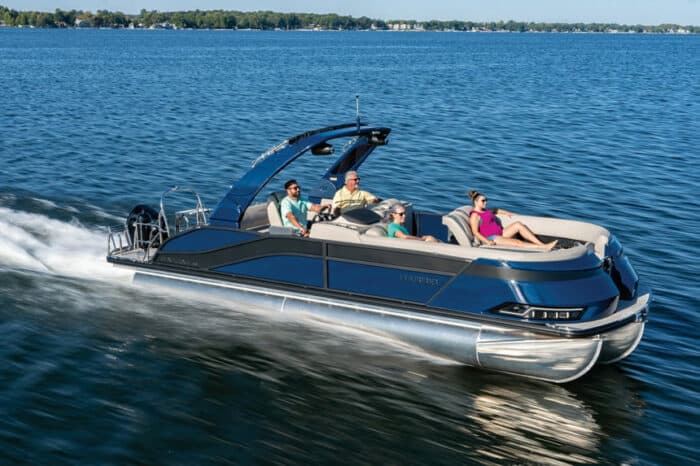
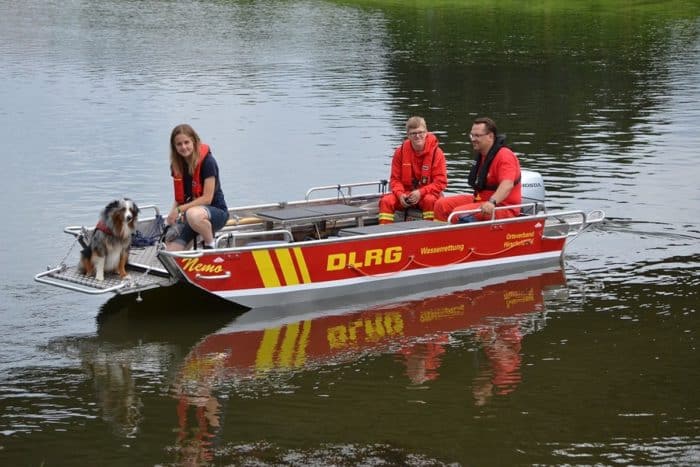





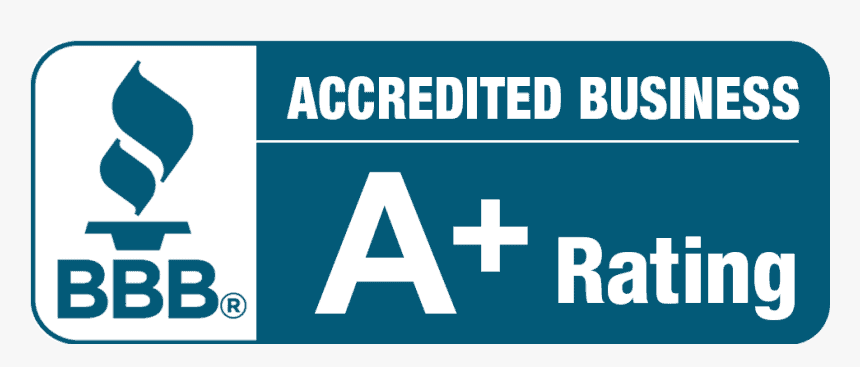


1 Comment
Richard Daley on September 18, 2023
If possible, remain in contact with authorities via radio or phone to provide updates on your location and condition.